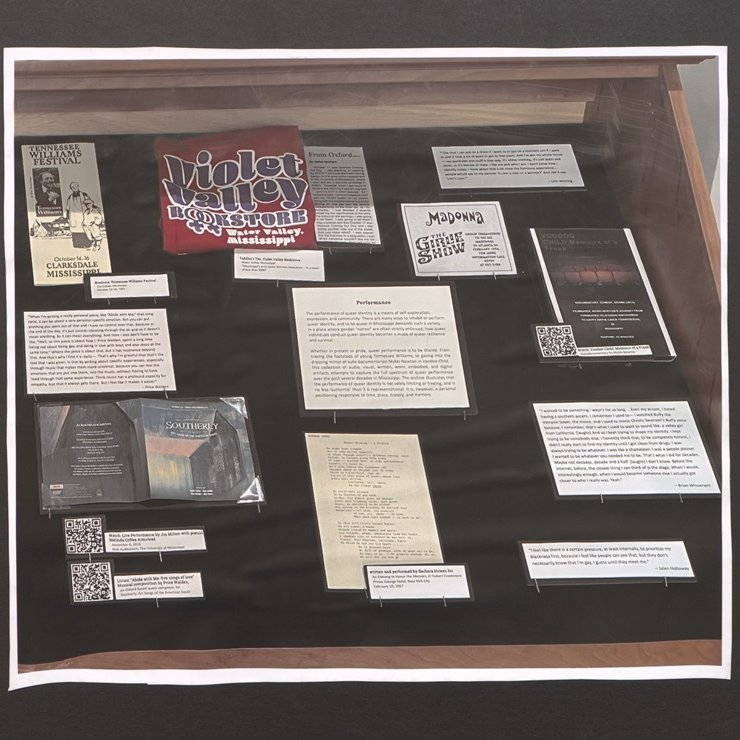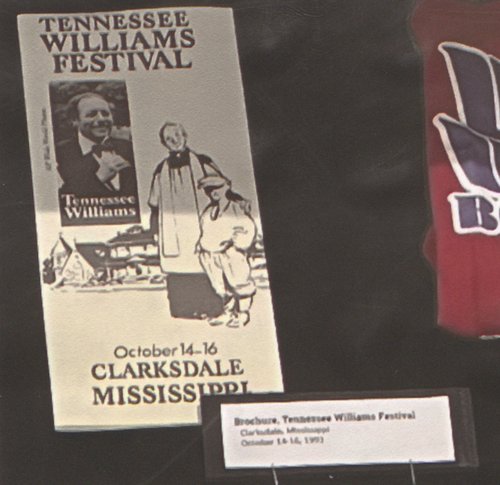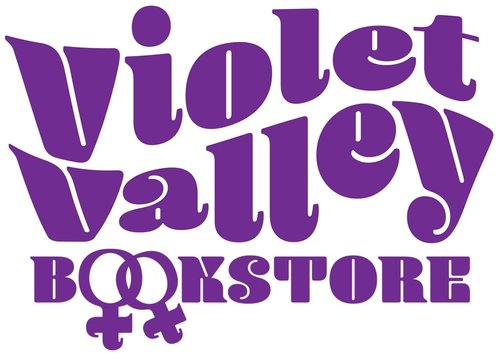Mississippians

The PERFORMANCE of queer identity is a means of self-exploration, expression, and community. There are many ways to inhabit or perform queer identity, and to be queer in Mississippi demands such a variety. In a place where gender “norms” are often strictly enforced, how queer individuals conduct clear identity becomes a mode of queer resilience and survival.
Whether in protest or pride, queer performance is to be shared from tracing the footsteps of young Tennessee Williams, to gazing into the dressing mirror of auto documentarian Mykki Newton, this collection of audio, visual, written, worn, embodied, and digital artifacts attempts to capture the full spectrum of queer performance over the past several decades in Mississippi. The archive illustrates that the performance of queer identity is not solely limiting or freeing, and is no less authentic than it is representational. It is, however, a personal positioning responsive to time, place, history, and memory.

Brochure from original Tennessee Williams Festival in Clarksdale, MS in 1993. (Now called the Mississippi Delta Tennessee Williams Festival)
Excerpts from Queer Mississippi Oral History Interviews
I feel like there is a certain pressure, at least internally, to prioritize my blackness first, because I feel like people can see that, but they don't necessarily know that I'm gay, I guess until they meet me. -- Jalen Holloway (2021)
I like that I can put on a dress if I want to or put on a business suit if I want to and it took a lot of work to get to that point. And I've got my whole house -- my wardrobe and stuff is that way. It's either nothing, it's just jeans and shirts, or it's female and male. I like me and who I am. I don't know how I identify today. I think about that a lot since the hormone experience... people would say to my partner "Is Linn a man or a woman?" and she'd say, "Linn's Linn". -- Linn Wotring (2019)
I wanted to be something I wasn't for so long... Even my accent, I hated having a southern accent. I remember I used to -- I watched Buffy the Vampire Slayer, the movie, and I used to mimic Christy Swanson's Buffy voice because, I remember, that's what I used to want to sound like: a valley girl from California. [laughs] And so I kept trying to shape my identity. I kept trying to be somebody else. I honestly think that, to be completely honest, I didn't really start to find my identity until I got clean from drugs. I was always trying to be a whatever. I was like a chameleon. I was a people pleaser. I wanted to be whatever you needed me to be. That's what I did for decades. Maybe not decades, decade and a half. [laughs] I don't know. Before the internet, before, the closest thing I can think of is the stage. When I would, interestingly enough, when I would become someone else I actually got closer to who I really was. Yeah. -- Brian Whisenant (2018)
When I'm writing a really personal piece, like “Abide with Me” that song it can be about a very personal specific emotion. But you can put anything you want out of that and I have no control over that. Because at the end of the day, it's just sounds vibrating through the air and so it doesn't mean anything. So it can mean everything. And then I also don't have to be like, “Well, so this piece is about how I, Price Walden, spent a long time being sad about being gay, and being in love with boys and also Jesus at the same time.” Where the piece is about that, but it has resonance beyond that. And that's why I find it a really – That's why I'm grateful that that's the tool that I was given. Is that by writing about specific experiences, especially through music that makes them more universal, because you can feel the emotions that are put into them, into the music, without having to have lived through that same experience. Think music has a profound capacity for empathy. Not that it always gets there. But I feel it makes it easier. – Price Walden (2019)
Watch: Live Performance by Jos Milton with pianist Melinda Coffee Armstead
Abide with Me: 5 songs of love by Price Walden, recorded on November 6, 2015 in the Nutt Auditorium at the University of Mississippi. Jos Milton, tenor; Melinda Coffee Armstead, piano
Listen: Musical composition by Price Walden
Southerly: Art Songs of the American South, Jos Milton and Melinda Coffee Armstead (2016) featuring "Abide with Me: 5 Songs of Love" by Price Walden, an Oxford-based queer composer.
Watch: Documentary by Mykki Newton
Voodoo Child: Memoirs of a Freak, directed by Mykki Newton (2013)
Filmmaker Mykki Newton's journey from tormented television anchorman to happy hippie chick transsexual in Mississippi
Link to: Violet Valley Bookstore

"Violet Valley Bookstore is Mississippi's only queer feminist bookstore -- in a town of less than 4,000"
